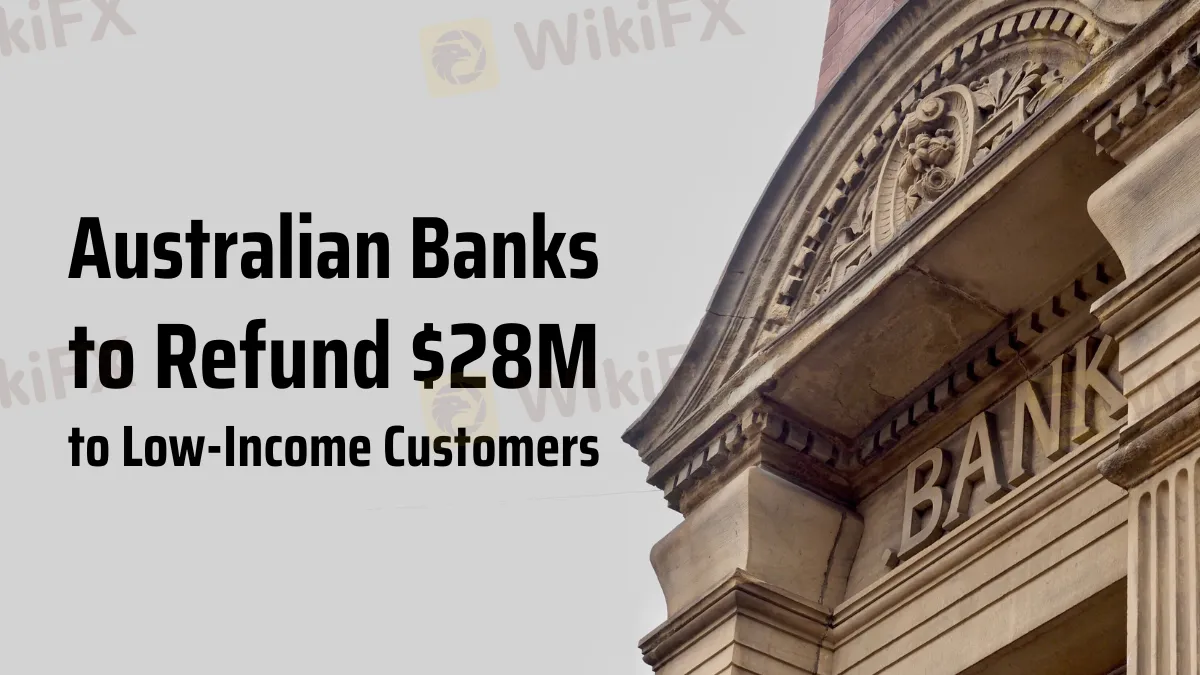简体中文
繁體中文
English
Pусский
日本語
ภาษาไทย
Tiếng Việt
Bahasa Indonesia
Español
हिन्दी
Filippiiniläinen
Français
Deutsch
Português
Türkçe
한국어
العربية
Australian Banks to Refund $28M to Low-Income Customers
abstrak:Four Australian banks will refund $28M to low-income customers, including First Nations individuals, after ASIC found many were kept in high-fee accounts.

Four central Australian banks, ANZ Bank, Bendigo and Adelaide Bank, Commonwealth Bank, and Westpac, have agreed to repay a total of $28 million to low-income clients, including First Nations people. This ruling follows an investigation by the Australian Securities and Investments Commission (ASIC), which discovered that these clients were held in high-fee bank accounts despite being eligible for lower-cost options.
The ASIC audit, issued today, revealed that more than two million consumers, many of whom receive Centrelink benefits, were paying excessive costs. Customers who receive particular government payments should be eligible for low-fee accounts, according to the banking code of practice. However, the analysis revealed that many of these low-income clients were stuck in high-fee accounts, drastically diminishing their savings.
According to Alan Kirkland, an ASIC commissioner, these hefty fees put a financial hardship on many consumers, particularly those in rural and isolated locations. These clients often struggled to manage their funds due to the banks' cumbersome procedures.
“Banks knew that many of these customers on low incomes were in inappropriate high-fee accounts,” claims Kirkland. He pointed out that prior to the study, banks only provided cumbersome “opt-in” procedures for clients to convert to low-fee choices, forcing some to drive long distances to the closest branch.
While banks had processes in place to identify consumers who were likely to be eligible for reduced-fee accounts, their attempts to convince these customers to transfer may have been more successful, with success rates as low as 0.5%.
In response to ASIC's findings, the banks have pledged to convert more than 200,000 clients to low-fee accounts, which are estimated to save them around $10.7 million annually. Over the next 12 to 18 months, banks will refund more than $28 million in fees, with $24.6 million going directly to those receiving ABSTUDY payments—a support scheme for Aboriginal or Torres Strait Islander students or apprentices—and those living in areas with significant First Nations populations.
Kirkland stressed the need of banks to do more to avoid such concerns from occurring in the future. “Banks need to ensure they have systems and processes in place, so customers on low incomes can easily transition to low-fee accounts, regardless of their location,” he told us.

Disclaimer:
Ang mga pananaw sa artikulong ito ay kumakatawan lamang sa mga personal na pananaw ng may-akda at hindi bumubuo ng payo sa pamumuhunan para sa platform na ito. Ang platform na ito ay hindi ginagarantiyahan ang kawastuhan, pagkakumpleto at pagiging maagap na impormasyon ng artikulo, o mananagot din para sa anumang pagkawala na sanhi ng paggamit o pag-asa ng impormasyon ng artikulo.
Broker ng WikiFX
Exchange Rate


